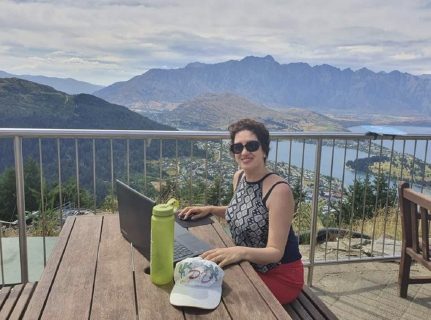Dedicated Certified Farsi/Persian and Dari Translator and Interpreter | Behnaz Dolatshahy
From a young age, Behnaz Dolatshahy has been guided by two passions: dance & music and languages. As a child, she would listen to songs in different languages, decipher the lyrics, and choreograph dances inspired by their meaning. This deep fascination with language led her to pursue a career in translation and interpreting, completing her degree and becoming a certified translator and interpreter in her home country, where she also founded a translation agency.
After moving to New Zealand over 15 years ago, Behnaz Dolatshahy continued her professional journey, furthering her education and becoming a full member of the New Zealand Society of Translators and Interpreters (NZSTI). She is also a NAATI-certified practitioner, working full-time in New Zealand and internationally.
In addition to her interpreting career, Behnaz taught dance for nearly a decade at various colleges and studios across New Zealand. Although she paused teaching during the COVID-19 pandemic, dance remains a cherished personal hobby.
eCALD Q&A with Behnaz Dolatshahy
How do interpreters support culturally and linguistically diverse individuals and communities?
Interpreters play a vital role in enabling accurate and impartial communication between people who do not share a common language. This allows individuals to access services, participate fully in society, and feel heard and understood.
Beyond language, interpreters often serve as cultural bridges—helping professionals understand cultural nuances that may affect communication. By adhering to the Interpreter’s Code of Ethics, which includes principles of accuracy, impartiality, and confidentiality, interpreters foster trust and encourage open dialogue. This helps create equitable access to services for diverse communities.
What challenges have you encountered in interpreting? Have you faced difficulties upholding the Code of Ethics?
Yes, interpreting comes with challenges. Clients may speak quickly, use long sentences, or share too much information at once, making it hard to keep up. Professionals may use jargon or technical language that is difficult for clients, especially those with limited education or literacy, to understand.
Remote interpreting adds another layer of complexity, with poor phone quality, unstable internet, or inadequate equipment affecting accuracy. In mental health settings, the absence of pre-briefing can be particularly problematic.
Long sessions without breaks can lead to fatigue, impacting both performance and well-being. Additionally, misunderstandings about the interpreter’s role are common. Practitioners or clients may expect interpreters to act as advocates, social workers, or even provide transport. While empathy is important, interpreters must remain impartial and focused solely on facilitating communication.
Training for practitioners on how to work effectively with interpreters and understand the Code of Ethics is essential to reduce these misunderstandings.
Do practitioners’ perceptions of interpreters differ from those of clients?
Yes. Some practitioners understand our professional role and treat us as communication specialists. Others may view us as assistants. Clients often see interpreters as helpers or community workers and may expect support beyond our scope—such as advice or personal assistance.
These differing perceptions highlight the need for greater awareness of the interpreter’s professional boundaries. When both practitioners and clients understand our role, communication becomes more respectful, effective, and fair.
Does a culturally responsive and trauma-informed approach shape your practice?
Absolutely. While interpreters do not provide counselling or intervene directly, our conduct can contribute to a trauma-informed and culturally responsive environment. I strive to be respectful, patient, and culturally aware—choosing words carefully and using a tone that helps clients feel safe and understood.
This is especially important when working with vulnerable individuals or those who have experienced trauma. Professionalism and sensitivity help create a space where communication can happen with dignity.
What do you believe is crucial to interpreting?
Practicing in accordance with the Interpreter’s Code of Ethics is fundamental. This ensures accuracy, impartiality, and confidentiality. Interpreters must remain professional and avoid stepping outside their defined role.
It is also critical that agencies and practitioners do not rely on family members, friends, or underaged children to interpret. These practices can lead to inaccuracies, breaches of confidentiality, and even trauma for those involved.
Interpreting is a profession that requires more than bilingual ability—it demands training, skill, and cultural competence. Only qualified interpreters should be engaged to ensure safe, effective, and high-quality communication.
